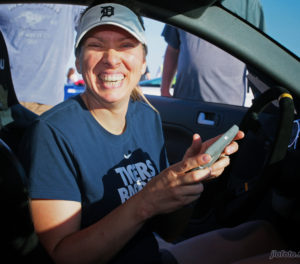Back in the Driver’s Seat After Brain Injury
Carol Kolk is an avid autocross racer. She’s also the survivor of a traumatic brain injury (TBI). Think the two are related? Sort of – but the accident that led to Carol’s brain injury happened when she and her car were at a complete standstill.
A Life in the Auto Industry
Carol lives in her home state of Michigan and works as a mechanical engineer at an automobile manufacturer. She’s a calibrator who ensures that maintenance indications appear at the right times – or, as Carol puts it, “I’m the person that puts numbers into the computer so that your car’s ‘CHECK ENGINE’ light comes on.”



2015 SCCA Pro Solo Finale
Lincoln, NE
©2015 Rupert Berrington
Carol grew up in a car family, attending car races and shows with her father as a kid. Her father collected classic cars, so many that Carol’s mother told him he had to sell some before he could buy more. That’s how Carol came to own a classic 1948 Ford that had been in the family since she was three months old. She calls it the “ice cream car” and uses it for excursions with her husband Jason and their kids, ages four and two, in their hometown of White Lake, Michigan.
Her love of cars and racing continued into adulthood as Carol got involved in autocross, a timed driving competition on an obstacle course defined by traffic cones and held on a large parking lot, airstrip, or runway. She sold her first car, a Chevelle, and saved up to buy a Trans Am for racing. She joined her company autocross team in 2006 and started practicing and racing five to six days a week, winning her first national championship in 2007.
The Life-Changing Accident
Carol loves helping people with problems and educating people about their cars. And she was doing just that – teaching someone how to drive a stick shift – when the accident happened that would dramatically impact her body, brain, career, and relationships.
When Carol recounts the story of her 2009 accident and the immediate aftermath, she’s quick to point out that she doesn’t remember any of the details. She shares what she’s been told by her family, friends, and healthcare team.
Carol was helping her friend perfect her driving when the accident happened. She and her friend were on a four-lane test track, stopped in a lane where you’re allowed to stop, when suddenly their compact car was hit from behind by a sport utility vehicle traveling around 68 miles per hour. The force of the SUV’s impact was so great that the rear bumper of the compact car pushed up all the way to the back of the front seats.
The rescue team forced the passenger car door open and began to put Carol, then unconscious, on a board for transport. Suddenly, she came to and began kicking, screaming, and swearing. “That’s when they knew it was brain trauma,” Carol notes, because this type of behavior is typical with brain injuries. She broke out of restraints twice, and had to be sedated before the emergency team could get her safely transported to University of Michigan hospital at Ann Arbor.
Her friend suffered a mild head injury, but for Carol, the accident was much more severe. At the hospital, CT scans revealed bleeding in Carol’s brain: dark spots that showed up in the imagery that later merged into one large spot. She was put into a coma for four days, then a shallow coma for two weeks, drifting in and out of conscious functioning. The injuries that Carol picked up from this accident are devastating and she would, unfortunately, face a long and tough road to recovery. But this was just the beginning of Carol’s long journey to full health.
“My husband has a whole new respect for me now because he says I’m a fighter” – Carol
The Aftermath of Brain Injury
While in the hospital, Carol couldn’t swallow, let alone walk or talk. She had a feeding tube and had to be helped to use the bathroom. Her body had to relearn everything, including positioning her body to help her brain reset to what upright was.
Most of the time, she remained with her eyes closed, sometimes making a low moaning sound, though her family recounts moments of clarity as well. For example, a jacket that she had ordered online arrived the day of the accident. Her husband brought it to the hospital four times and “gifted” it to her. She forgot each time. “It was kind of like the movie 50 First Dates,” Carol says, laughing. On the fourth time, she remembered and said “you gave this to me yesterday.” That was a good sign.
A couple of weeks later, she was beginning to feel better physically, but couldn’t remember anything and didn’t understand what happened or why she was in the hospital. She didn’t believe her husband when he told her she had a brain injury. But when Carol went to speech therapy, she realized something was truly wrong. The therapist gave her an exercise where she was supposed to read instructions and make markings on a grid. “I read the entire set of instructions like it was one run-on sentence and became completely overwhelmed,” Carol recalls. “And I’m an engineer!”
It also became clear that they would need to take it slowly. The first day her husband took her home from the hospital for a day trip, the short car drive was completely overwhelming to Carol. “It was too much to process. I was exhausted and had to take a two-hour nap.”
Even simple things seemed monumental. Carol found that she couldn’t close her eyes in the shower without losing her balance. When she tried to fold laundry, all she could manage was to fold one shirt before becoming tired and needing a nap.
Bumps in the Road
Carol was discharged after five weeks in the hospital, and started her recovery, facing frustrations and struggles along the way.
She didn’t find much help in the initial recovery services she was referred to, feeling that they treated her like a stroke patient who needed help with motor skills, even though she was highly functioning. After taking a neuropsychology test, the administrator pointed out a series of deficits to Carol, without any suggestions for improvement. “I was just so frustrated and overwhelmed and left there crying,” she says. She hired a driver to take her back to the University of Michigan for other recovery services.
Back at work, Carol struggled with getting her work done and interacting with her coworkers.
“I had trouble concentrating, learning new things, and finishing things…I was so overwhelmed that I would skip out working and got in trouble,” she says. “And being able to relax and just talk to people was really hard. I didn’t want them to think anything was wrong with me, but that was really the wrong approach. Even just the volume at which they talked seemed so loud to me.”
Carol thought maybe it was the group she was in that was the problem. Eventually, she left on maternity leave, and when she returned to work, she joined a different group. Again she struggled. “I was a wreck. I questioned why I survived the accident.”
Getting Back on Track
Pregnant at the time, Carol didn’t want to go on medication. But she knew she needed help. She found a new support group and a new doctor, and gives the most credit for her recovery to her work with Brain Trainers, a cognitive rehabilitation company in Ann Arbor, Michigan that works with higher functioning people who are dealing with brain injuries.
Unlike Carol’s previous experience with rehabilitation doctors, she met with a doctor who pointed out all of her deficits but offered something else: help with addressing them. “He said, ‘I can help you with all these things. We start on January 4


Her doctor also gave a name to the sense of overwhelming Carol frequently felt: flooding, or when an injured brain is trying to process too much information that it’s difficult to think clearly. With Brain Trainers’ help, Carol learned strategies to cope with flooding – and the impact it had not only on Carol, but on her family. “I would have blow-ups at people in my family and I didn’t know why and couldn’t tell them. I couldn’t think straight or see straight. I could hardly breathe when I got overwhelmed.”
Her doctor suggested she stop very deliberately and take either a mental or physical break from a situation before speaking or making a decision. After that advice, she learned that sometimes she needed to leave the room, take some time, and when she came back, say, “sorry, I had a brain injury moment there. But I’m back.”
Carol is self-deprecating when admitting that her recovery is a continuing process. “I have a hard time thinking before I speak. I get in trouble sometimes. Things that other people think, I say out loud.” Her coaching has helped her improve her impulse control and take “that two-millisecond break” before reacting.
Exercise also helps Carol personally and as a parent. “Going to the gym has really helped me become way more patient, which really helps me with my kids. When I can be more patient, it helps them be more patient too.”
Racing Ahead
Carol needed her new coping skills at the race track as well as at work and home. She had tried to get back into racing a few years after the injury, but she struggled. It wasn’t so much the driving, but interacting with people at the track. As part of her rehabilitation, her Brain Trainers coach suggested she give a presentation on autocross because it was something she knew a lot about. After the presentation, he could see how enthusiastic she was about autocross and suggested she give it another try. She was pregnant at the time with her son, though, so she waited another year or so before racing.



Aug 02, 2015: SCCA Pro Solo – Cincinnati Region at Wilmington Air Park, Wilmington Ohio
When she did, it took a few tries. She freely admits that her first attempts, in a front-wheel-drive car, were “horrible.” But she borrowed a rear-wheel-drive car, her old one, in fact, to give it another try. She shook with excitement after that course. “I said, ‘This is what I was missing! THIS is autocross!'”
And with that, she was back in the driver’s seat. Carol didn’t have money for a new car, but a friend let her use his, as long as she paid the insurance. She rebuilt the shocks and put other work into the car, doing only five events before the next big challenge: SCCA Solo Nationals.
Going into Nationals, Carol’s attitude was one of gratefulness and excitement, thinking: “I’m just happy to be here and doing this again. I just want to have a good time.”
It rained the night before the race but it stopped raining just as the event was starting. Carol took her first run. To her surprise, she was leading the field in time. She won the second run too. By the time the third run came around, it had dried out and she was beating the entire field by 1.2 seconds, “which is huge in autocross,” Carol says.
On the second day of the competition, it was clear that Carol was the winner once her nearest competitor did her final run and couldn’t beat Carol’s time. Feeling it would be unsportsmanlike to skip out, Carol took her own final run, and hit a cone. That didn’t disqualify or dampen Carol’s elation on her victory, though. “I couldn’t believe it,” she says. “I thought, ‘Really – I won? Get out of here!'”
Advice for Others Coping With Brain Injury (or any health condition really)
In autocross, the driver has to follow the course carefully, take curves gracefully and efficiently, and make split-second decisions that impact the outcome, all while staying calm and focusing on the prize. The same could be said for Carol’s approach to managing her life after her brain injury.
For others coping with brain injury, in themselves or someone they know, Carol offers lessons learned from her own experience.
- Accept reality. Let down your guard and accept the reality of the situation. “Being in this group setting where you’re encountering your deficits can be really frustrating, but you have to face it to make it better. You have to really get into it before you can get out of it,” she says.
- Be patient. For Carol, that meant recognizing the difference between her former self and her current self. “Sometimes I just have to say ‘Old Carol may have been able to do this, no problem. New Carol needs a little bit of help, but once she gets that, she can do this.'”
- Be open. When thinking back on her experience returning to work, Carol wishes she had been more upfront with her coworkers about her brain injury, or had a doctor come in to educate the team about what to expect.
- Keep at it! Carol encourages others to keep fighting.
“My husband has a whole new respect for me now because he says I’m a fighter,” she says. “I never gave up. I kept fighting and working at it. He’s still amazed that I kept pushing.”

